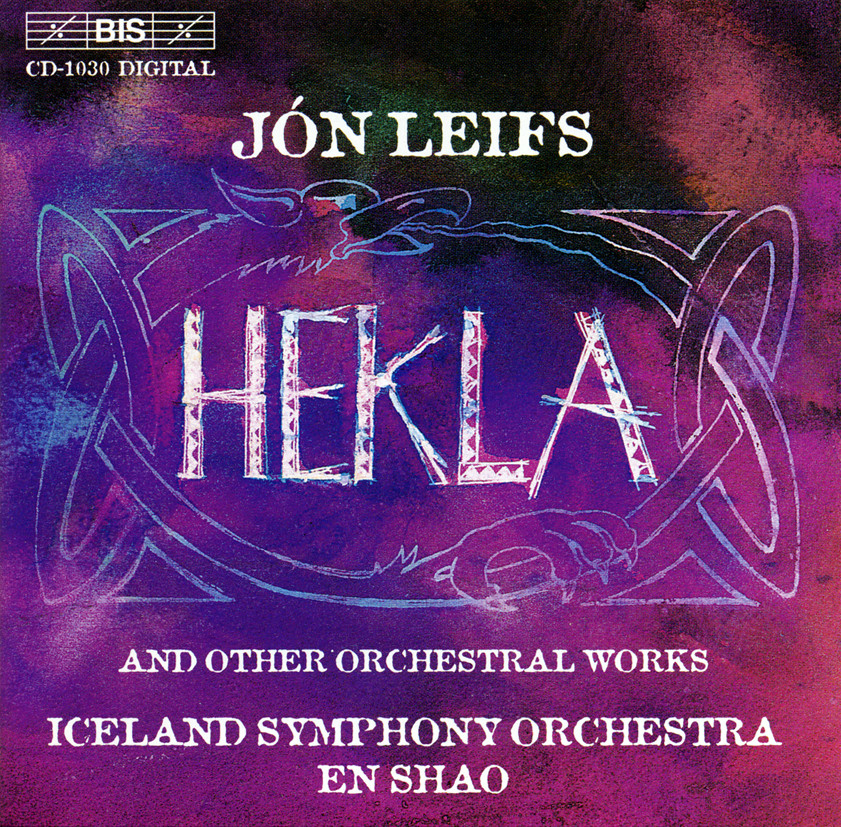I've been quite obsessed with listening to various versions of Mozart's Oboe Concerto lately. An example: https://www.youtube.com/watch?v=3DI3z2Tgz3U
You are using an out of date browser. It may not display this or other websites correctly.
You should upgrade or use an alternative browser.
You should upgrade or use an alternative browser.
Classical Music and You: Share and Discuss your Favorites
- Thread starter Amir0x
- Start date
- Status
- Not open for further replies.
close to the edge
Member
Yeah, that's neat! I rediscovered this video of Sviatoslav Richter playing a Chopin etude today. What a beast.
Been listening to Rachmaninoff Piano Concerto No. 2 second movement a lot: https://youtu.be/XzuD5hveXuM
I really didn't like this piece when I was younger. As my piano teacher told me, you will understand some pieces more when you're older.
I really didn't like this piece when I was younger. As my piano teacher told me, you will understand some pieces more when you're older.
Aggelos
Member
Recently grabbed this one. Lucien Cailliet delivers

http://www.musicweb-international.com/classrev/2015/Sep/Cailliet_arrangements_PASC444.htm
http://www.audaud.com/lucien-caille...ormandyreinerstokowskifiedler-pristine-audio/
http://www.youtube.com/watch?v=ZG-90nvs0cQ
https://www.youtube.com/watch?v=_9rm-S3XAgI
When Eugene Ormandy began taking over the reigns of the Philadelphia Orchestra from Leopold Stokowski, he followed in the former Maestro's footsteps by conducting many orchestral transcriptions. These he commissioned from the orchestra's 'house arranger' and principal clarinet, Lucien Cailliet. Here is Cailliet's splendid orchestration of the Preludio in Bach's Solo Violin Partita No. 3 (BWV 1006). It was recorded in 1937 and can be heard, along with other Cailliet transcriptions, on Pristine Audio PASC 444.

http://www.musicweb-international.com/classrev/2015/Sep/Cailliet_arrangements_PASC444.htm
http://www.audaud.com/lucien-caille...ormandyreinerstokowskifiedler-pristine-audio/
http://www.youtube.com/watch?v=ZG-90nvs0cQ
https://www.youtube.com/watch?v=_9rm-S3XAgI
When Eugene Ormandy began taking over the reigns of the Philadelphia Orchestra from Leopold Stokowski, he followed in the former Maestro's footsteps by conducting many orchestral transcriptions. These he commissioned from the orchestra's 'house arranger' and principal clarinet, Lucien Cailliet. Here is Cailliet's splendid orchestration of the Preludio in Bach's Solo Violin Partita No. 3 (BWV 1006). It was recorded in 1937 and can be heard, along with other Cailliet transcriptions, on Pristine Audio PASC 444.
Aggelos
Member
Guys, Gliere is one my favourite composers! Eversince I came to know his orchestral works, I can't live my life without thinking about Gliere.
Usually most people think very high of his 3rd Symphony, but the rest of his works does not fail to deliver!
A nice page dedicated to Gliere's life and work
http://www.reinhold-gliere.net/index8.htm
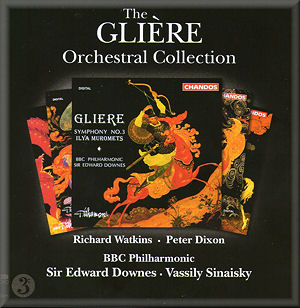
http://www.musicweb-international.com/classrev/2011/Oct11/Gliere_CHAN106795X.htm
http://www.musicweb-international.com/classrev/2011/Nov11/Gliere_collection_CHAN10679X.htm
http://www.musicweb-international.com/classrev/2000/nov00/Glieremultiple.htm
http://www.classical-music.com/review/gliereginastera
------------------------------------------------------------------------------------------------------------------------------------------------
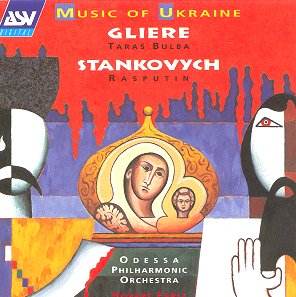
http://www.musicweb-international.com/classrev/2000/oct00/gliere.htm
----------------------------------------------------------------------------------------------------------------------------------------------------

http://www.classical.net/music/recs/reviews/n/nxs50898a.php
http://www.musicweb-international.com/classrev/2000/nov00/gliere.htm
-------------------------------------------------------------------------------------------------------------------------------------------

https://sdtom.wordpress.com/2011/07...inor-op-25red-poppy-ballet-suite-op-70gliere/
--------------------------------------------------------------------------------------------------------------------------------------------

http://www.classicstoday.com/review/falletta-buffalo-define-glieres-monumental-third-symphony/
http://www.musicweb-international.com/classrev/2014/Mar14/Gliere_sy3_8573161.htm
http://www.musicweb-international.com/classrev/2015/Feb/Gliere_sy3_NBD0041.htm
http://www.musicweb-international.com/classrev/2014/Sep14/Gliere_sy3_NBD0041.htm
http://www.sa-cd.net/showtitle/10058
http://audaud.com/2014/09/gliere-sy...orch-joann-falletta-naxos-audio-only-blu-ray/
http://www.classicalsource.com/db_control/db_cd_review.php?id=12102
http://www.classicalmusicsentinel.com/KEEP/keep-gliere.html
http://classicalmodernmusic.blogspot.com/2014/04/reinhold-moritsevich-gliere-symphony-no.html
http://maestrosteve.xanga.com/2014/04/03/fabulous-new-monumental-gliere/
http://www.classical-cd-reviews.com/2014/02/gliere-symphony-no-3-falletta-buffalo.html
-------------------------------------------------------------------------------------------------------------------------------------
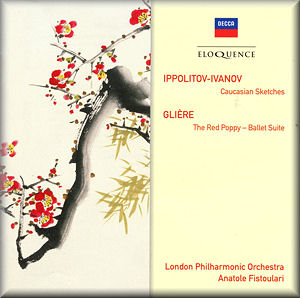
http://www.musicweb-international.com/classrev/2011/Mar11/ippolitov_caucasian_4802428.htm
--------------------------------------------------------------------------------------------------------------------------------------------
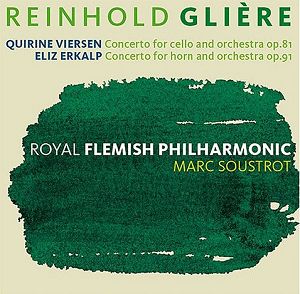
http://www.musicweb-international.com/classrev/2007/Dec07/Gliere_DOM292996.htm
http://www.sa-cd.net/showtitle/4696
---------------------------------------------------------------------------------------------------------------------------------------------

http://www.classicstoday.com/review/review-8347/
http://www.allmusic.com/album/glière-violin-concerto-op-100-symphony-no-2-in-c-minor-mw0001941204
----------------------------------------------------------------------------------------------------------------------------------

http://www.allmusic.com/album/glière-the-red-poppy-complete-ballet-mw0001797941
https://sdtom.wordpress.com/2008/04/04/the-red-poppy-complete-balletgliere/
http://www.theclassicalshop.net/Details.aspx?CatalogueNumber=NA 3496
--------------------------------------------------------------------------------------------------------------------------------------------

http://www.allmusic.com/album/release/glière-orchestral-works-mr0002704496
http://www.theclassicalshop.net/Details.aspx?CatalogueNumber=MP 3675
----------------------------------------------------------------------------------------------------------------------------------------------------------------------------
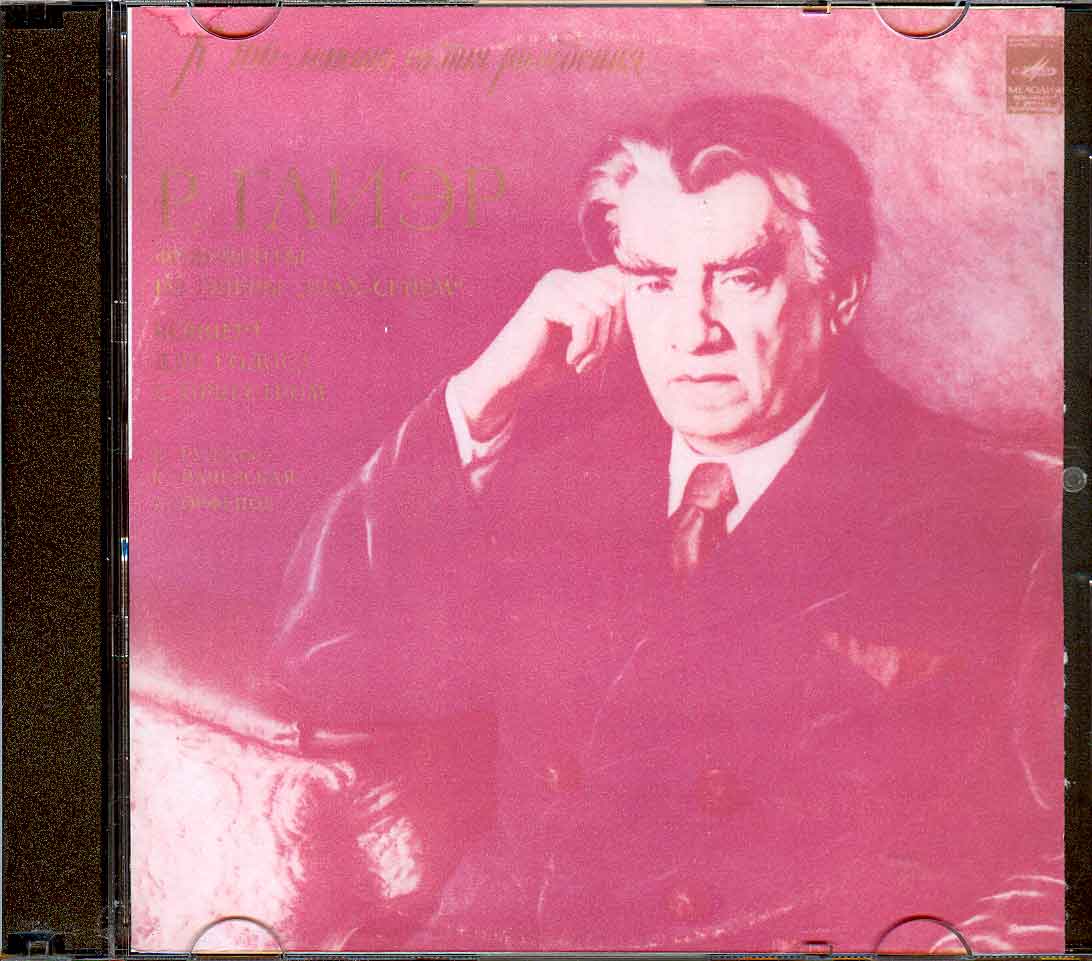
http://militscky.narod.ru/cd-r2.html
GLIERE, REINHOLD Shakh-Senem, Opera excerpts, Concerto
VSG/Melodiya, Mono M10-36867 GOST 5289-73
"Shakh-Senem", Opera excerpts
Anatoly Orfenov
K.Rachevskaya
All-Union Radio Orchestra, Reinhold Gliere, G.Stolyarov conductors
Concerto for Voice and Orchestra, op.82
Bella Rudenko soprano
Kiev Philharmonic Orchestra, Stepan Turchak conductor
---------------------------------------------------------------------------------------------------------------------------------------------------------------------------------

Gliere's Khrizis and Sheep's Spring
http://www.allmusic.com/album/reinh...duets-for-violin-and-cello-op-39-mw0001534992
http://www.allmusic.com/album/release/reinhold-gliere-ballet-suites-nos1-and-2-mr0002156964
-------------------------------------------------------------------------------------------------------------------------
Usually most people think very high of his 3rd Symphony, but the rest of his works does not fail to deliver!
A nice page dedicated to Gliere's life and work
http://www.reinhold-gliere.net/index8.htm

http://www.musicweb-international.com/classrev/2011/Oct11/Gliere_CHAN106795X.htm
http://www.musicweb-international.com/classrev/2011/Nov11/Gliere_collection_CHAN10679X.htm
http://www.musicweb-international.com/classrev/2000/nov00/Glieremultiple.htm
http://www.classical-music.com/review/gliereginastera
------------------------------------------------------------------------------------------------------------------------------------------------

http://www.musicweb-international.com/classrev/2000/oct00/gliere.htm
----------------------------------------------------------------------------------------------------------------------------------------------------

http://www.classical.net/music/recs/reviews/n/nxs50898a.php
http://www.musicweb-international.com/classrev/2000/nov00/gliere.htm
-------------------------------------------------------------------------------------------------------------------------------------------

https://sdtom.wordpress.com/2011/07...inor-op-25red-poppy-ballet-suite-op-70gliere/
--------------------------------------------------------------------------------------------------------------------------------------------

http://www.classicstoday.com/review/falletta-buffalo-define-glieres-monumental-third-symphony/
http://www.musicweb-international.com/classrev/2014/Mar14/Gliere_sy3_8573161.htm
http://www.musicweb-international.com/classrev/2015/Feb/Gliere_sy3_NBD0041.htm
http://www.musicweb-international.com/classrev/2014/Sep14/Gliere_sy3_NBD0041.htm
http://www.sa-cd.net/showtitle/10058
http://audaud.com/2014/09/gliere-sy...orch-joann-falletta-naxos-audio-only-blu-ray/
http://www.classicalsource.com/db_control/db_cd_review.php?id=12102
http://www.classicalmusicsentinel.com/KEEP/keep-gliere.html
http://classicalmodernmusic.blogspot.com/2014/04/reinhold-moritsevich-gliere-symphony-no.html
http://maestrosteve.xanga.com/2014/04/03/fabulous-new-monumental-gliere/
http://www.classical-cd-reviews.com/2014/02/gliere-symphony-no-3-falletta-buffalo.html
-------------------------------------------------------------------------------------------------------------------------------------

http://www.musicweb-international.com/classrev/2011/Mar11/ippolitov_caucasian_4802428.htm
--------------------------------------------------------------------------------------------------------------------------------------------

http://www.musicweb-international.com/classrev/2007/Dec07/Gliere_DOM292996.htm
http://www.sa-cd.net/showtitle/4696
---------------------------------------------------------------------------------------------------------------------------------------------

http://www.classicstoday.com/review/review-8347/
http://www.allmusic.com/album/glière-violin-concerto-op-100-symphony-no-2-in-c-minor-mw0001941204
----------------------------------------------------------------------------------------------------------------------------------

http://www.allmusic.com/album/glière-the-red-poppy-complete-ballet-mw0001797941
https://sdtom.wordpress.com/2008/04/04/the-red-poppy-complete-balletgliere/
http://www.theclassicalshop.net/Details.aspx?CatalogueNumber=NA 3496
--------------------------------------------------------------------------------------------------------------------------------------------

http://www.allmusic.com/album/release/glière-orchestral-works-mr0002704496
http://www.theclassicalshop.net/Details.aspx?CatalogueNumber=MP 3675
----------------------------------------------------------------------------------------------------------------------------------------------------------------------------

http://militscky.narod.ru/cd-r2.html
GLIERE, REINHOLD Shakh-Senem, Opera excerpts, Concerto
VSG/Melodiya, Mono M10-36867 GOST 5289-73
"Shakh-Senem", Opera excerpts
Anatoly Orfenov
K.Rachevskaya
All-Union Radio Orchestra, Reinhold Gliere, G.Stolyarov conductors
Concerto for Voice and Orchestra, op.82
Bella Rudenko soprano
Kiev Philharmonic Orchestra, Stepan Turchak conductor
---------------------------------------------------------------------------------------------------------------------------------------------------------------------------------

Gliere's Khrizis and Sheep's Spring
http://www.allmusic.com/album/reinh...duets-for-violin-and-cello-op-39-mw0001534992
http://www.allmusic.com/album/release/reinhold-gliere-ballet-suites-nos1-and-2-mr0002156964
-------------------------------------------------------------------------------------------------------------------------
close to the edge
Member
I've been a fan of this Youtube channel, which uploads all sorts of piano music in great interpretations with some nice commentary in the video description. I've (re)discovered a bunch of pianists because of this channel, most recently Janina Fialkowska and Rafal Blechacz, who both play some fantastic Chopin. Blechacz' recording of the Chopin polonaises is probably my favorite interpretation of those pieces.
Aggelos
Member
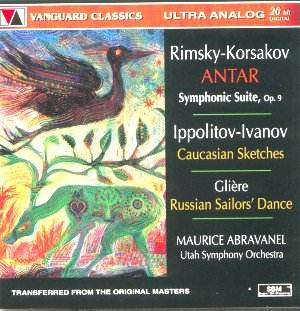
http://www.musicweb-international.com/classrev/2000/aug00/antar.htm
--------------------------------------------------------------------------------------------------------------------
Another composer that I have a soft spot for, is Fikret Amirov
Amirov (1922-1984) wrote highly coloured music. This is ethnic-dramatic and ranges from poetic middle eastern exotic to gaudily raucous. You might well end up grouping these works written during the period 1940-1970 with those of Khachaturian.
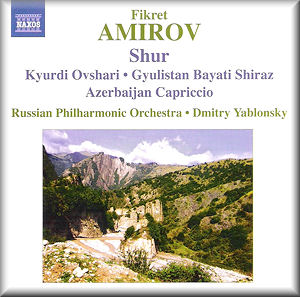
http://www.musicweb-international.com/classrev/2010/July10/Amirov_Symphonic_Mugams_Naxos8572170.htm
http://www.classicstoday.com/review/review-15375/
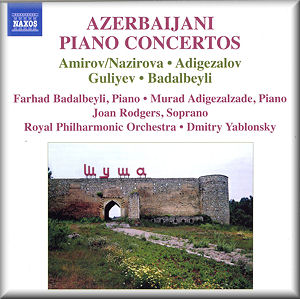
http://www.musicweb-international.com/classrev/2011/Dec11/Azerbaijan_PCs_8572666.htm
http://www.musicweb-international.com/classrev/2011/Nov11/Azerbaijan_PCs_8572666.htm
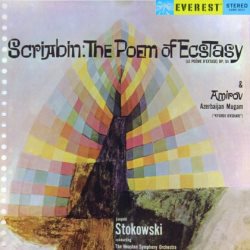
http://www.classicalmusiccommunications.com/agency.php?view=news&nid=5756
http://www.musicweb-international.com/classrev/2014/Aug14/Scriabin_ecstasy_SDBR3032.htm
http://www.sa-cd.net/showtitle/9358
http://www.classical.net/music/recs/reviews/e/evc03032a.php
http://www.musicweb-international.com/classrev/2013/Dec13/Everest_again.html
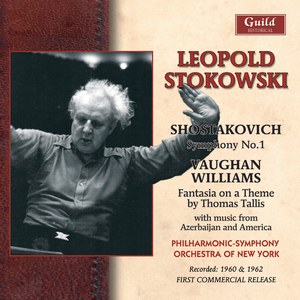
http://www.musicweb-international.com/classrev/2014/Aug14/Shostakovich_sy1_GHCD2415.htm
http://www.guildmusic.com/shop/wbc.php?tpl=produktdetail.html&pid=16135

http://www.allmusic.com/album/fikre...-mugam-no-1-azerbaijan-capriccio-mw0001826691
http://www.musicweb-international.com/classrev/2015/Nov/ASV_Russian.htm

http://www.allmusic.com/album/fikre...d-ovshari-gülistan-bayaty-shiraz-mw0001820478
http://www.catawiki.com/catalog/rec...ands/adigezalov-yalchin/1818263-fikret-amirov

http://www.allmusic.com/album/release/the-arabian-nights-mr0002736017
http://www.catawiki.com/catalog/rec...rauf/1818441-fikret-amirov-the-arabian-nights

http://www.catawiki.com/catalog/rec...ic-from-tajikistan-georgia-azerbaijan-armenia
http://www.allmusic.com/album/release/music-from-tajikistan-georgia-azerbaijan-armenia-mr0002515874
http://www.musicweb-international.com/classrev/2003/Apr03/Azerbaijaniset.htm
Aggelos
Member
I have a very soft spot for Rene Leibowitz
http://www.angelfire.com/music2/reneleibowitz/rl.html
http://www.bach-cantatas.com/Bio/Leibowitz-Rene.htm
J.S Bach / Rene Leibowitz : Passacaglia and Fugue in C Minor BWV 582 (conductor & arranger)
http://www.youtube.com/watch?v=uv6sSFGJmbM
Bach-Gounod / Rene Leibowitz : Ave Maria (conductor & arranger)
http://www.youtube.com/watch?v=pTKwojNHWNY
"Greensleeves" - Rene Leibowitz conducts
https://www.youtube.com/watch?v=ZB3ndMa3k_I
"Greensleeves" is best-known in Vaughan Williams's version but here it is beautifully arranged for strings and harp by Rene Leibowitz. He conducts the New Symphony Orchestra of London on a Readers Digest "Concert Favourites" LP.
Franck 'Panis Angelicus' - Rene Leibowitz, conductor / arranger
https://www.youtube.com/watch?v=hUxkmsIfeIs
Franck's setting of the hymn 'Panis Angelicus' ('The Angelic Bread') is here played by the New Symphony Orchestra of London in an arrangement by the conductor Rene Leibowitz. It comes from a 1960s LP entitled 'Concert Favourites' .

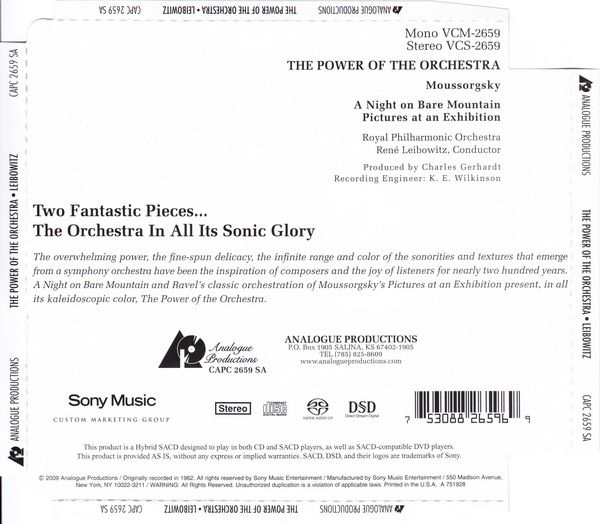
http://store.acousticsounds.com/d/6...The_Power_of_The_Orchestra-Hybrid_Stereo_SACD
http://www.sa-cd.net/showtitle/6107
http://www.allmusic.com/album/the-power-of-the-orchestra-mw0001957370
------------------------------------------------------------------------------------------------------------------------------


http://www.norpete.com/c0032.html
http://www.mdt.co.uk/leibowitz-rene-the-art-of-italiana-leibowitz-scribendum-13cds.html
http://www.scribendumrecordings.com/our-shop/4583959841/sc510-13cd---the-art-of-leibowitz/10114478
amazon co uk reviewer says
As far as I am concerned, Leibowitz has the following orchestral transcriptions:
-Franck / Rene Leibowitz : Panis Angelicus
-Mussorgsky / Rene Leibowitz : Night on Bald Mountain
-Traditional / Rene Leibowitz : Greensleeves & Londonderry Air
-J.S Bach / Rene Leibowitz : Passacaglia and Fugue in C Minor BWV 582
- Dvorak / Rene Leibowitz : Humoresque
- J.S. Bach / Rene Leibowitz: Toccata and Fugue in D Minor BWV 565 [Boelke-Bomart Inc.]
Instrumentation : pic.2(2.pic).2(2.ca).Ebcl.1.bcl.2.cbsn - 4.2.2.btbn.1 - timp.perc(tri, cym, tam-t, tamb, b.d) - hp.pno(cel) - str
http://www.schott-france.com/shop/Sheet_Music/orchestra/2682321/2263327/show,303087.html
-Mozart / Rene Leibowitz : Fantasia for Mechanical Organ KV 594, for double string orchestra [Boelke-Bomart Inc.]
http://www.schott-france.com/shop/9/show,303112.html
-Schoenberg / Rene Leibowitz : Three Songs Op. 48 (for Low Voice and Orchestra) [Boelke-Bomart Inc.]
Instrumentation : 1,1, 2+1, 1, - 1,1,1,0 - hp - pf.
-Schubert / Rene Leibowitz : Fantasia in C Major (originally for violin and piano D.943) [Boelke-Bomart Inc.]
Instrumentation : 2,2,2,2 - 2,2,3,1 - pf - str
http://www.schott-france.com/shop/9/show,308325.html
-Schubert / Rene Leibowitz : Fantasia in F Minor (originally for piano 4-hands Op.103) [Boelke-Bomart Inc.]
Instrumentation : 2,2,2,2 - 2,2,3,1 - timp - str
http://www.schott-france.com/shop/9/show,319689.html
http://www.angelfire.com/music2/reneleibowitz/rl.html
http://www.bach-cantatas.com/Bio/Leibowitz-Rene.htm
J.S Bach / Rene Leibowitz : Passacaglia and Fugue in C Minor BWV 582 (conductor & arranger)
http://www.youtube.com/watch?v=uv6sSFGJmbM
Bach-Gounod / Rene Leibowitz : Ave Maria (conductor & arranger)
http://www.youtube.com/watch?v=pTKwojNHWNY
"Greensleeves" - Rene Leibowitz conducts
https://www.youtube.com/watch?v=ZB3ndMa3k_I
"Greensleeves" is best-known in Vaughan Williams's version but here it is beautifully arranged for strings and harp by Rene Leibowitz. He conducts the New Symphony Orchestra of London on a Readers Digest "Concert Favourites" LP.
Franck 'Panis Angelicus' - Rene Leibowitz, conductor / arranger
https://www.youtube.com/watch?v=hUxkmsIfeIs
Franck's setting of the hymn 'Panis Angelicus' ('The Angelic Bread') is here played by the New Symphony Orchestra of London in an arrangement by the conductor Rene Leibowitz. It comes from a 1960s LP entitled 'Concert Favourites' .


http://store.acousticsounds.com/d/6...The_Power_of_The_Orchestra-Hybrid_Stereo_SACD
http://www.sa-cd.net/showtitle/6107
http://www.allmusic.com/album/the-power-of-the-orchestra-mw0001957370
Audiophiles will welcome the Analogue Productions reissue of the famous RCA stereo LP called The Power of the Orchestra. This features René Leibowitz conducting the Royal Philharmonic Orchestra in music of Mussorgsky, the Ravel orchestration of Pictures at an Exhibition, and a unique arrangement of A Night on Bare Mountain, recorded in 1962.Collectors will remember the original LP cover which is reproduced on the SACD. Producer Charles Gerhardt and engineer Kenneth Wilkinson had worked with Leibowitz a number of times before, particularly in 1961 when they made their memorable set of Beethoven symphonies, today still one of the best-sounding versions of this music. The Gerhardt/Wilkinson team went all out to make this Mussorgsky disk a sonic spectacular, with some gimmicks, particularly addition of a wind machine and gongs at the climax of Night just before the soft closing passage. Gerhardt told me they decided they didn't want to use the Stokowski ending for Night, and he asked Leibowitz to write "a wild one," which, indeed, he did, and if I recall correctly, Leibowitz did it overnight! At the end of the soft closing passage in the original, we hear the new version: mysterious rumblings in the bass and a Schoenbergesque restatement of the principal theme punctuated by massive gongs. It is quite exciting, indeed. In Pictures, xylophone repeated passages are heard once on each side, to great effect. This is a two-track stereo recording and no attempt has been made to produce "surround" soundhowever, the transfer from the analog originals as processed here permits us to hear these exciting performances as never before. It is a premium price issue, but worth it.
http://www.classicalcdreview.com/MC309.html
------------------------------------------------------------------------------------------------------------------------------


http://www.norpete.com/c0032.html
http://www.mdt.co.uk/leibowitz-rene-the-art-of-italiana-leibowitz-scribendum-13cds.html
http://www.scribendumrecordings.com/our-shop/4583959841/sc510-13cd---the-art-of-leibowitz/10114478
René Leibowitz was born in Warsaw on 17 February, 1913. Eventually he made Paris his home where he studied composition with Ravel and Schönberg, and also studied orchestration with Ravel. Additionally, he studied composition with Webern and conducting with Pierre Monteux. René Leibowitz made his début as a conductor in 1937 with the Chamber Orchestra of the French Radio in Europe and the United States. In 1944 he taught composition and conducting to many pupils, including Pierre Boulez (composition only), Antoine Duhamel, and Vinko Globokar.
René Leibowitz's repertoire as a conductor spanned virtually everything, including opera, from the Baroque to the most modern 20th century composers. Leibowitz was also known as an orchestrator. His arrangement and recording of Bach's Passacaglia and Fugue in c minor for double orchestra is just one of the unique achievements of his in this area. His most famous orchestration is his re-orchestration and recording of Mussorgsky's Night on Bare Mountain. Apparently the maestro had reservations regarding several aspects of the famous Rimsky-Korsakov version. He even made a special trip to Russia to study all the available manuscripts before creating his own rendition. Leibowitz completely eliminated the fanfares, as well as implemented many other orchestral and musical changes. The Leibowitz version ends with a huge crescendo and is quite powerful.
Leibowitz's conducting repertoire, which spanned virtually everything, is well represented in this comprehensive 13 CD set. Many recordings featured in this set have been available only as downloads. Glorious, inspired, unique interpretations. During the war he was an active member of the French resistance against the Nazis. After WW II, Leibowitz became one of the most sought-after conductors in Europe and his well deserved reputation is extensively represented in this set. This set includes Leibowitzs acclaimed Beethoven symphonies cycle also noted for attempting to follow very precisely Beethoven's metronome marks.
- Readers Digest
amazon co uk reviewer says
These are the recordings that René Leibowitz (1913-1972) made for Reader's Digest back in the 1960s.
[there are a few omissions - see below under "Points of Interest"]
Charles Gerhardt (on loan from RCA) was producer, and the Decca engineering staff - headed by Kenneth Wilkinson - was in charge of the recording sessions.
Other conductors who recorded for the mail-order program included Sir John Barbirolli, Sir Adrian Boult, Antal Dorati, Jascha Horenstein, Rudolf Kempe, Josef Krips, Charles Munch, Fritz Reiner and Sir Malcolm Sargent.
Gorgeous Decca-quality stereo sound.
Despite not being sold in stores, the Reader's Digest records sold well.
[the 12 LP box "A Festival of Light Classical Music" sold two million copies.]
A lot of sophisticates never knew these recordings existed.
The Reader's Digest was not required reading for highbrows.
This is a timely release.
Polish-born but naturalized Frenchman René Leibowitz is almost forgotten today.
In the 1930s and '40s, he was better known as a composer - a disciple of Arnold Schoenberg and Anton Webern,
Teacher of Pierre Boulez.
You'd never guess this from his recorded repertoire (the Reader's Digest wasn't interested in atonal music).
In addition to Beethoven, Mozart, Schubert, Schumann and Stravinsky, there is a lot of light music in this collection
- not just Offenbach overtures, but even Gilbert and Sullivan (overture to H.M.S. Pinafore).
PACKAGING AND SOUND
Thirteen CDs in cardboard jackets with timings and recording information printed on the back.
Disappointing cover art - the black and white cover photo is re-used on each jacket.
Couldn't they at least find a color photo of Leibowitz?
Unfortunately no booklet is included. A major omission - Leibowitz is not a household name.
There is an excellent Leibowitz website - see the first comment following my review.
About three-quarters of this material was released on the audiophile CD label Chesky back in the '90s.
The rest is new to CD.
The Beethoven Symphonies were issued ten years ago by Scribendum in excellent sound (I don't have the earlier Chesky CDs for comparison).
I do own the Chesky CD of "An Evening of Opera" and did an A-B comparison with CD 6 in the Scribendum set.
My ears aren't perfect (I'm 66 years old) but I couldn't hear any difference.
The Sorcerer's Apprentice is spectacularly engineered.
HOW READER'S DIGEST SAVED THE ROYAL PHILHARMONIC:
The Reader's Digest recording program began in 1960 with recordings by London orchestras recording under pseudonyms:
The London Philharmonic recorded as the "International Symphony Orchestra".
The London Symphony recorded as "The London Festival Orchestra".
Not sure if this was due to contractual obligations or because the musicians were embarrassed to be associated with the Reader's Digest.
The "New Symphony Orchestra of London" had a long career in the recording studios (RCA recorded concerti with Heifetz and Rubinstein) but I don't think it gave public concerts (rumored to be the Orchestra of the Royal Opera House).
Sir Thomas Beecham, founder of the Royal Philharmonic, died in March 1961.
There was concern for the orchestra's survival.
Not too much of an exaggeration to say that Reader's Digest saved the Royal Philharmonic.
The orchestra's first project after the death of Beecham was a complete set of Beethoven Symphonies conducted by Leibowitz (in this box)
1962 was a busy year:
In addition to Leibowitz, the Royal Philharmonic made records with Barbirolli (Sibelius), Horenstein (Rachmaninov), Kempe (Respighi), Munch (Bizet, Tchaikovsky), Reiner (Brahms), Sargent (Handel's Messiah), and many more.
+ Piano Concerti with Earl Wild
+ Gilbert & Sullivan with The D'Oyly Carte Opera
All sponsored by the Reader's Digest.
POINTS OF INTEREST:
-- When released in 1962, Leibowitz's Beethoven Symphony set was completely overshadowed by Herbert von Karajan's first (of three) Berlin Philharmonic sets on Deutsche Grammophon.
Too bad.
Leibowitz's Beethoven is not "better" than Karajan's, but it is more interesting.
Fast and Brutal performances.
Not philosophical or spiritual, but tremendously exciting nonetheless.
A common enough approach to the Fifth Symphony, but unexpected in the Ninth.
The finale of Beethoven's Ninth is supposed to be an Ode to Joy, and the Brotherhood of Man.
This performance will have none of that.
This is an Angry Ninth - clear from the snarling phrasing of the double basses in their recitative.
When the singer comes in, he's not lyrical and comforting (like Walter Berry for Karajan).
Instead the legendary German bass Ludwig Weber (born 1899) is dark and menacing.
At Bayreuth his roles were Hunding and Hagen - Wagner's blackest villains - and there is no disguising that voice.
A scary "Ode to Joy".
This is one of the great performances of Beethoven's Ninth, but I'm not sure that I even like it.
-- The Mozart and Schubert Symphonies receive swift but not lightweight performances.
Despite the tempo, Leibowitz (and the engineers) do an excellent job of clarifying the counterpoint in the finale of Mozart's Jupiter Symphony.
In Schubert's Great C Major Symphony, the performance tradition at the time was to slow down for the codas of the first and fourth movements (contrary to the printed score).
Leibowitz maintains the same swift tempo right to the end.
This is one case where I prefer tradition to the composer's score. .
[Scandalous]
I miss the dramatic sense of arrival when the tempo broadens.
-- Mussorgsky's Pictures at an Exhibition is played in the familiar Ravel orchestration,
but Night on Bare Mountain is neither the Rimsky-Korsakov version, nor Mussorgsky's original (which in 1962 was known only to musicologists).
The Leibowitz orchestration starts out conventionally, but becomes progressively more wacky.
He even uses a wind machine - actually two wind machines (one for each channel).
-- Schumann's Rhenish Symphony:
It used to be commonplace for conductors to tinker with Schumann's orchestration.
[Mahler re-orchestrated all the symphonies.]
Leibowitz's version is pretty extreme, with a particularly annoying trumpet in the first movement.
Hard to recommend, although the finale is certainly rousing.
-- Leibowitz provides tasteful orchestrations for "Greensleeves" and "Londonderry Air" (aka "London Derriere" or "Danny Boy").
Uncredited orchestrations of Bach-Gounod, Bizet, Chopin, Dinicu, Dvorak and Franck.
Most are tastefully done, but Chopin's Op.53 Polonaise is grotesquely over-orchestrated.
-- The "Gade" on CD 7 is not classical composer Niels Gade (1817-1890) but bandleader Otto Gade (1879-1963).
His popular song "Jalousie" (1925) became an international hit when Arthur Fiedler recorded it with the Boston Pops.
Reader's Digest recordings not in this box:
---- Bach: Passacaglia & Fugue in C Minor BWV 582 (orch. Leibowitz) - Royal Philharmonic (1962)
---- Debussy: Clair de lune - RCA Italiana Symphony Orchestra (early 1960s)
---- Gershwin: Suite from Porgy and Bess - New Symphony Orchestra of London (1961)
---- Mendelssohn: Midsummer Night's Dream Overture - Royal Philharmonic (1962)
---- Mendelssohn: Scherzo from Octet for Strings - Royal Philharmonic (1962)
---- Mendelssohn: Violin Concerto, with Hyman Bress - Royal Philharmonic (1962)
---- Ravel: Rapsodie Espagnole - Orchestra Filarmonica di Roma (early 1960s)
---- Rossini: Dances from William Tell - RCA Italiana Symphony Orchestra (early 1960s)
---- Weber: Freischutz Overture - Royal Philharmonic (1962)
---- Weber: Oberon overture - Royal Philharmonic (1962)
[two to three CDs worth of material.]
http://www.amazon.co.uk/dp/B013S2PG8C/
As far as I am concerned, Leibowitz has the following orchestral transcriptions:
-Franck / Rene Leibowitz : Panis Angelicus
-Mussorgsky / Rene Leibowitz : Night on Bald Mountain
-Traditional / Rene Leibowitz : Greensleeves & Londonderry Air
-J.S Bach / Rene Leibowitz : Passacaglia and Fugue in C Minor BWV 582
- Dvorak / Rene Leibowitz : Humoresque
- J.S. Bach / Rene Leibowitz: Toccata and Fugue in D Minor BWV 565 [Boelke-Bomart Inc.]
Instrumentation : pic.2(2.pic).2(2.ca).Ebcl.1.bcl.2.cbsn - 4.2.2.btbn.1 - timp.perc(tri, cym, tam-t, tamb, b.d) - hp.pno(cel) - str
http://www.schott-france.com/shop/Sheet_Music/orchestra/2682321/2263327/show,303087.html
-Mozart / Rene Leibowitz : Fantasia for Mechanical Organ KV 594, for double string orchestra [Boelke-Bomart Inc.]
http://www.schott-france.com/shop/9/show,303112.html
-Schoenberg / Rene Leibowitz : Three Songs Op. 48 (for Low Voice and Orchestra) [Boelke-Bomart Inc.]
Instrumentation : 1,1, 2+1, 1, - 1,1,1,0 - hp - pf.
-Schubert / Rene Leibowitz : Fantasia in C Major (originally for violin and piano D.943) [Boelke-Bomart Inc.]
Instrumentation : 2,2,2,2 - 2,2,3,1 - pf - str
http://www.schott-france.com/shop/9/show,308325.html
-Schubert / Rene Leibowitz : Fantasia in F Minor (originally for piano 4-hands Op.103) [Boelke-Bomart Inc.]
Instrumentation : 2,2,2,2 - 2,2,3,1 - timp - str
http://www.schott-france.com/shop/9/show,319689.html
nailbombxx
Member
At this point,I am completely convinced that Bruckner is the greatest symphonist to have ever lived.
I can't call him the greatest composer,because he largely focused on one genre ,and he's not diverse enough.
But yeah, he's a greater symphonist than even Beethoven and Mahler for me.
Admittedly,I didn't explore Mahler in depth ,but I feel like I've already fallen in the Bruckner camp..Its gonna be difficult to convert.
He just seems much more logically coherent structurally.But his expression is just as unrestrained and earth shattering.
I can't call him the greatest composer,because he largely focused on one genre ,and he's not diverse enough.
But yeah, he's a greater symphonist than even Beethoven and Mahler for me.
Admittedly,I didn't explore Mahler in depth ,but I feel like I've already fallen in the Bruckner camp..Its gonna be difficult to convert.
He just seems much more logically coherent structurally.But his expression is just as unrestrained and earth shattering.
nailbombxx
Member
How does everyone here listen to their classical?
I honestly can't really listen to most classical unless I'm completely focused on it or else I'll miss too much. I sit down, close my eyes and just listen to whatever on my headphones. Multitasking is not an option.
I honestly can't really listen to most classical unless I'm completely focused on it or else I'll miss too much. I sit down, close my eyes and just listen to whatever on my headphones. Multitasking is not an option.
What is the best Bruckner symphony to start?At this point,I am completely convinced that Bruckner is the greatest symphonist to have ever lived.
I can't call him the greatest composer,because he largely focused on one genre ,and he's not diverse enough.
But yeah, he's a greater symphonist than even Beethoven and Mahler for me.
Admittedly,I didn't explore Mahler in depth ,but I feel like I've already fallen in the Bruckner camp..Its gonna be difficult to convert.
He just seems much more logically coherent structurally.But his expression is just as unrestrained and earth shattering.
What is the best Bruckner symphony to start?
It depends on how trained your ear is and if you are used to large scale work.
Symphony no.4 is the easiest one to listen to. (and one of the best ones)
Dont force yourself to sit through an entire symphony,its ok to just listen each movement till you can get an ear for it and then combine them later if you like.
Also,try to different recordings as each van be very different in how they handle Bruckner.
His best symphonies are 4,7,8,9.
nailbombxx
Member

Franz Liszt - Totentanz, S. 525 (piano and orchestra)
Incredible piece of furious, phantasmagorical romanticism for piano and orchestra. Great, lively performance.
close to the edge
Member

Franz Liszt - Totentanz, S. 525 (piano and orchestra)
Incredible piece of furious, phantasmagorical romanticism for piano and orchestra. Great, lively performance.
Yeah, that's a really cool piece of music. The beginning wouldn't sound out of place in a Bartok piano concerto.
I went to a piano trio recital last week and I've been on a chamber music binge since then. They played Schubert's 2nd piano trio and Brahms' first, which I hadn't known until that point.
8thWhat is the best Bruckner symphony to start?
i would recommend Furtwangler or Jocchum conducting
I had no idea there was a Classical Music Gaf, warms my heart!
I'm a classical guitarist & earn my living teaching and playing music. It's so great to see so many here sharing their favourite works.
I've also been an obsessive Brucknerian since around 2014, I came to him quite late but no composer has really moved me the way he does. Ironically my favourite Symphony of his is the 5th. The polyphony is earth shatteringly profound. I imagine Bach flipping through the score and smiling. As far as I'm concerned any of his Symphonies from 4-9 are masterpieces whilst 1-3 still have much to offer. Part of the fun of listening to Bruckner is discovering the different versions of his symphonies. He lacked confidence and was easily swayed into revising and altering his work by his peers and students. Going back and listening to the original version of the 8th is incredible. I'd recommend this recording as a place to start.
https://www.highresaudio.com/en/album/view/3jqcuq/philharmonia-zrich-fabio-luisi-bruckner-symphony-no-8-in-c-minor-wab-108-original-version-1887
As an aside, does anyone have an opinion on completions of his 9th? I thought that Simon Rattle's 2012 recording was highly convincing.
http://www.prestoclassical.co.uk/r/Warner%2BClassics/9529692
I'm a classical guitarist & earn my living teaching and playing music. It's so great to see so many here sharing their favourite works.
I've also been an obsessive Brucknerian since around 2014, I came to him quite late but no composer has really moved me the way he does. Ironically my favourite Symphony of his is the 5th. The polyphony is earth shatteringly profound. I imagine Bach flipping through the score and smiling. As far as I'm concerned any of his Symphonies from 4-9 are masterpieces whilst 1-3 still have much to offer. Part of the fun of listening to Bruckner is discovering the different versions of his symphonies. He lacked confidence and was easily swayed into revising and altering his work by his peers and students. Going back and listening to the original version of the 8th is incredible. I'd recommend this recording as a place to start.
https://www.highresaudio.com/en/album/view/3jqcuq/philharmonia-zrich-fabio-luisi-bruckner-symphony-no-8-in-c-minor-wab-108-original-version-1887
As an aside, does anyone have an opinion on completions of his 9th? I thought that Simon Rattle's 2012 recording was highly convincing.
http://www.prestoclassical.co.uk/r/Warner%2BClassics/9529692
Frank Zappa - Dog Breath Variations & Uncle Meat performed by the Ensemble Modern.
Frank Zappa - G-Spot Tornado performed by the Ensemble Modern.
Frank Zappa - Peaches En Reglia performed by the Talichova Komorní Filharmonie.
Frank Zappa - Strictly Genteel performed by the London Symphony Orchestra.
Frank Zappa - G-Spot Tornado performed by the Ensemble Modern.
Frank Zappa - Peaches En Reglia performed by the Talichova Komorní Filharmonie.
Frank Zappa - Strictly Genteel performed by the London Symphony Orchestra.
close to the edge
Member
I had no idea there was a Classical Music Gaf, warms my heart!
I'm a classical guitarist & earn my living teaching and playing music. It's so great to see so many here sharing their favourite works.
I've also been an obsessive Brucknerian since around 2014, I came to him quite late but no composer has really moved me the way he does. Ironically my favourite Symphony of his is the 5th. The polyphony is earth shatteringly profound. I imagine Bach flipping through the score and smiling. As far as I'm concerned any of his Symphonies from 4-9 are masterpieces whilst 1-3 still have much to offer. Part of the fun of listening to Bruckner is discovering the different versions of his symphonies. He lacked confidence and was easily swayed into revising and altering his work by his peers and students. Going back and listening to the original version of the 8th is incredible. I'd recommend this recording as a place to start.
https://www.highresaudio.com/en/album/view/3jqcuq/philharmonia-zrich-fabio-luisi-bruckner-symphony-no-8-in-c-minor-wab-108-original-version-1887
As an aside, does anyone have an opinion on completions of his 9th? I thought that Simon Rattle's 2012 recording was highly convincing.
http://www.prestoclassical.co.uk/r/Warner%2BClassics/9529692
I've always thought the ending to Bruckner's 9th was appropriate without a 4th movement. It reminds me of the ending to Mahler's 9th (which I believe was influenced by Bruckner). It's weird how sometimes, the quiet endings are the most impactful ones, to me at least (e.g. also Beethoven's last piano sonata).
I found this excellent recording of Schubert's piano trios (and the single-movement Notturno) on Spotify. It's played on period instruments (including a fortepiano) and it's real good: https://open.spotify.com/album/5Du6sP3TFI2soF0tPatDM1
Also, there's this fantastic Youtube channel, which uploads great piano music with sheet music and some really good writing in the descriptions. https://www.youtube.com/channel/UC2q7OXP-mPxHzJerA9tXe7Q
I found Moravec's recording of Chopin's Nocturnes through there and it's unlike any other I've listened to.
The Brandenburg Concertos are one of my favorites. Bach arranged some amazing combinations of instrumentation for these pieces, and I enjoy seeing them every year performed live.
Free download in MP3 and FLAC
Blu-Ray of a live performance
Concerto #3 performed in 4K
Concert at Lincoln Center Dec 2017
Free download in MP3 and FLAC
Blu-Ray of a live performance
Concerto #3 performed in 4K
Concert at Lincoln Center Dec 2017
nailbombxx
Member
John Tavener - Eternal Memory (Cello and Orchestra)
Another great piece by Tavener - kind of similar to "The Protecting Veil". I love these kinds of mysterious, metaphysical pieces (though I'm not too keen on sacred choral music unless its backed by orchestra).
Any recommendations for pieces similar to this?
Another great piece by Tavener - kind of similar to "The Protecting Veil". I love these kinds of mysterious, metaphysical pieces (though I'm not too keen on sacred choral music unless its backed by orchestra).
Any recommendations for pieces similar to this?
I had no idea there was a Classical Music Gaf, warms my heart!
I'm a classical guitarist & earn my living teaching and playing music. It's so great to see so many here sharing their favourite works.
I've also been an obsessive Brucknerian since around 2014, I came to him quite late but no composer has really moved me the way he does. Ironically my favourite Symphony of his is the 5th. The polyphony is earth shatteringly profound. I imagine Bach flipping through the score and smiling. As far as I'm concerned any of his Symphonies from 4-9 are masterpieces whilst 1-3 still have much to offer. Part of the fun of listening to Bruckner is discovering the different versions of his symphonies. He lacked confidence and was easily swayed into revising and altering his work by his peers and students. Going back and listening to the original version of the 8th is incredible. I'd recommend this recording as a place to start.
https://www.highresaudio.com/en/album/view/3jqcuq/philharmonia-zrich-fabio-luisi-bruckner-symphony-no-8-in-c-minor-wab-108-original-version-1887
As an aside, does anyone have an opinion on completions of his 9th? I thought that Simon Rattle's 2012 recording was highly convincing.
http://www.prestoclassical.co.uk/r/Warner%2BClassics/9529692
I really need to dedicate myself and study the fifth.I still don't understand it.
The fact that there's no ending to the 9th is rather heartbreaking to me. While ,yes, the adagio itself has an immensely satisfying coda ,there's no doubt that the actual finale was probably going to be insane.
I know its kinda unfair ,but I mentally can't accept an ending completed by someone else. Harnoncourt made a lecture where he discusses the sketches left behind and suggested that the finale may have been stolen and might be out there...Maybe they'll find it in our lifetimes.
nailbombxx
Member
Jón Leifs - Hekla, Op. 52 for orchestra and percussion
Incredibly explosive and apocalyptic symphonic poem by Scandinavian composer Jón Leifs. Depicts the eruption of a volcano. Cannot attest the quality of the youtube video, but the BIS recording is wonderful and is available on spotify.
The piece Hekla, Op 52 (1964) by Icelandic composer Jón Leifs, has been called the "loudest classical music of all time". The requirements for a performance of Hekla include four sets of rocks hit with hammers, steel plates, anvils, sirens, cannons, metal chains, choir, a large orchestra, and organ.
I think I may have damaged my hearing a bit just listening to it with headphones! That may sound like a mess, but it's really quite a marvel to hear.
close to the edge
Member
I've been addicted to this guy's chiptune style renditions of Bach fugues and preludes. Bach's music is crazy in how his music sounds good whatever you play it on. There's a vocaloid version of the first chorus of the St. Matthew Passion and it's amazing.
https://www.youtube.com/watch?v=aYi6vg4ZDt8
Contrapunctus 14 from the Art of Fugue. Maybe the greatest fugue ever written and it's incomplete.
https://youtu.be/0aDwT_Dkhuk
One of my favorite pieces from the WTC, the E major fugue from book 2.
https://www.youtube.com/watch?v=AAafyK44fCc
The vocaloid version of "Kommt ihr Töchter, helft mir klagen" from the St. Matthew Passion
https://www.youtube.com/watch?v=aYi6vg4ZDt8
Contrapunctus 14 from the Art of Fugue. Maybe the greatest fugue ever written and it's incomplete.
https://youtu.be/0aDwT_Dkhuk
One of my favorite pieces from the WTC, the E major fugue from book 2.
https://www.youtube.com/watch?v=AAafyK44fCc
The vocaloid version of "Kommt ihr Töchter, helft mir klagen" from the St. Matthew Passion
- Status
- Not open for further replies.


